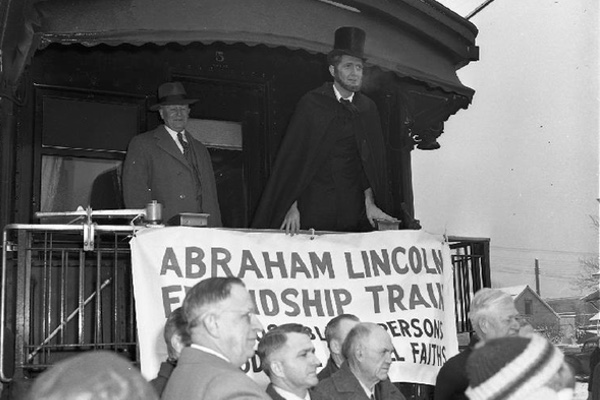How Lincoln Helped to Win the Peace After World War II

As we celebrate President Abraham Lincoln’s birthday this month, let’s remember some of his lesser known roles too. Even long after his death, Lincoln's influence has continued in ways perhaps unexpected.
In fact, Lincoln helped to win the peace after World War II.
It was 1948 and the war-devastated nations were starving. Hunger was the enemy of World War II that had yet to be defeated. Enter Lincoln.
Farmers in Nebraska decided to celebrate Lincoln's birthday by donating food to the hungry overseas in Europe and Asia. This was the best way to honor Lincoln who once said, "With Malice toward none and charity toward all."
The food crisis after the war threatened to spiral the world into chaos. There could be no peace built on empty stomachs.
The Abraham Lincoln Friendship Train was launched from Lincoln, Nebraska on his birthday, February 12th. The Christian Rural Overseas Program sponsored it, bringing together churches and religions to fight hunger. Food was packed onto Lincoln’s train.
Carloads of supplies from Wyoming and other western states were joined with the train in Nebraska. They headed east toward Iowa and onward as far as Philadelphia, gathering more donations.
Wheat, milk, flour and other foods were collected. They were loaded onto ships and sent on their way.
Austria, Germany, Poland, Korea and Japan were some of the countries to get this much needed aid. Families, who had lost everything during the war, gained nourishment. They were given hope. Their children were spared from malnutrition.
This was food for peace. Lincoln's Friendship Train was part of a series of hunger fighting events which preceded the Marshall Plan that rebuilt Europe. As Lincoln once said we should "do all which may achieve and cherish a just and lasting peace among ourselves and with all nations."
This is history especially worth remembering as we have more hungry refugees now than any time since World War II. The United States has a Food for Peace program that can help them.
Food for Peace fights hunger overseas in partnership with the UN World Food Programme, Catholic Relief Services, Save the Children and other charities.
The creation of Food for Peace was inspired by the Lincoln Friendship Train and all the generous outreach from Americans after the war. We need to improve and increase Food for Peace to meet today’s emergencies.
Think of the millions of families who have fled the onslaught of ISIS in Iraq and Syria. They are starving and need food to survive.
In the Ukraine, an escalating conflict has caused another hunger emergency. The UN World Food Programme, which never had to operate in the Ukraine prior, is now bringing food to war victims there. They are rapidly increasing the size of the relief mission.
Famine is threatening South Sudan and the Central African Republic. The world cannot turn away from these countries in desperate need.
The only path to a lasting peace is to end hunger everywhere. That was the idea behind the Lincoln Friendship Train. That spirit, which so many Americans took part, must continue today.